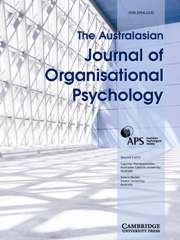Article contents
A Critical Examination of the Internal Consistency of Competencies Assessed Across Multiple Methods
Published online by Cambridge University Press: 23 February 2012
Abstract
Competency models represent a popular concept that is widely applied in such areas as human resource selection, performance management, employee development, and job analysis. Despite widespread popularity and applied use, little is known about the measurement properties of competencies and whether they can reasonably be used to provide meaningful feedback or as a basis for employment decisions. The present study evaluated the internal consistency of multimethod competency scores obtained from a developmental assessment centre. A total of 214 managers participated in this study. Results suggested that there was virtually no support for the idea that multimethod-derived competencies could be regarded as meaningful, internally consistent, underlying characteristics. The article argues that competency models that employ multimethod approaches merely provide a semantic framework for conveying the complexity of a person specification, a framework which is qualitative not quantitative. These findings are discussed in relation to their implications for behavioral assessment in employment.
Keywords
- Type
- Articles
- Information
- Copyright
- Copyright © Cambridge University Press 2011
- 1
- Cited by




